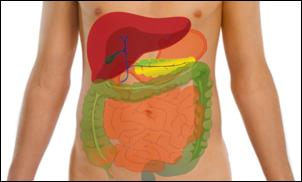Analyzing food quality with an artificial intestine: the NutriChip

© 2012 EPFL
EPFL researchers have developed a miniature on-chip gastrointestinal tract in order to observe the effects of various nutrients on health. The “NutriChip” project’s in vitro tests have already begun, on dairy products.
What happens in our bodies when we have eaten something? Are “healthy” food products actually good for us, once they have been digested and absorbed? Supported by Nano-Tera and Nestlé, the NutriChip project developed by Martin Gijs’s team at the Laboratory of Microsystems 2 (LMIS2) provides new insights to these questions. The NutriChip is a miniature artificial intestinal wall that can be used to identify foods that cause inflammation in the human body.
Preventing chronic inflammatory illness
“Generally, once a given food has been digested and absorbed by the intestine, it carries certain molecules into the body, such as Palmitic acid,” says Guy Vergères, a member of the Agroscope Liebefeld-Posieux (ALP) Research Center, which is collaborating on the project. These molecules set off an immune response, in the form of slight, temporary inflammation. Biomarkers for inflammation, notably cytokines, can then be found in the blood. This is a normal phenomenon, but it must be monitored. “If this happens over and over for a long period of time, it can set the stage for inflammatory chronic illnesses,” warns Vergères.
The NutriChip platform makes it possible to compare different foods in terms of their ability to lower the concentrations of those biomarkers – and thus possibly their ability to reduce inflammation itself. The research team began its tests with milk, a food that is widely consumed in Switzerland. “Some studies have shown that dairy products can reduce the concentration of inflammatory biomarkers in the blood, while others did not find any significant reduction in concentrations. With the NutriChip, we will be able to make a contribution to this debate,” says Martin Gijs.
The complexities of artificial digestion
The human body is complex, and designing a miniature artificial gastrointestinal system proved to be extremely exacting. The solution provided by researchers at EPFL ultimately took the shape of a two-level chip, whose levels are connected via a porous membrane.
The upper level, which represents the intestinal wall, is made of a homogeneous layer of cultured epithelial cells. The lower level repre

sents the circulatory system and is made up of immune system cells, and in particular macrophages. The macrophages’ job within the human body is to keep it clean: when they encounter any potentially dangerous agents they release molecules such as cytokines that activate other immune-system cells. The NutriChip platform uses CMOS high-resolution optical sensors developed by Sandro Carrara’s team in the EPFL’s Integrated Sytems Lab in order to precisely detect and measure cytokine production by the immune cells that are on the other side of the layer of intestinal wall cells. These measurements, which are performed using fluorescence, show exactly how much inflammation is caused by a given food.
“We have to reproduce every stage in the digestive process before food hits the intestine,” says Professor Gijs. Milk, for instance, is successively digested by the enzymes and chemical components from the saliva, gastric juices, pancreatic juices and bile. The mixture that emerges from this process is then applied to the upper level of the NutriChip.
Is milk an anti-inflammatory?
Some studies have found that milk can reduce the concentration of inflammatory biomarkers in humans. However, these results need to be confirmed. “On another front, studies are being done on volunteers at the Bern University Hospital to find links between body mass, diet, and pro-inflammatory cytokine production,” says Martin Gijs. “The study participants eat various types of meals, and then afterwards their cytokine levels are measured via a blood test. Blood tests could tell us whether we obtain the same results with the NutriChip artificial intestine.” If the project team does obtain the same results, this will pave the way for in vitro screening of various types of foods to determine their pro- or anti-inflammatory potentials. The most promising foods could then be tested more intensely, via nutritional studies.
NutriChip is supported by Nano-Tera